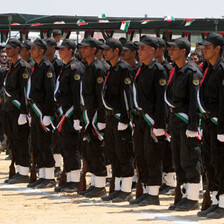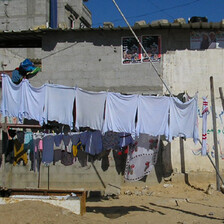The Electronic Intifada 26 April 2006

Mahmoud Abbas (Alfred/SIPA)
Palestinian Authority Chairman Mahmoud Abbas is playing a dangerous game, working at every level to undermine the democratically elected Hamas administration in the Palestinian Authority. He is not viewing the Hamas-led government as part of the Palestinian Authority which he heads, or as the government he appointed and was sworn in before him; he sees it as a rival.
Hamas’ landslide election victory shocked the world and the Palestinian political establishment. Because Hamas won fair and square, it has been hard for those unhappy with the result to overturn it outright. So a broad-based coalition of election result rejectionists presented Hamas with a long list of demands. This despite the fact that Hamas had committed itself to good governance, fighting corruption and maintaining the year-long truce that it had initiated with Israel despite ongoing Israeli war crimes against Palestinian civilians and resistance organisations.
Although the “international community” said Hamas should be given a chance, it wasted no time cutting off aid, making threats and spurning the political openings presented by the Hamas leaders who indicated their readiness to break with long-held positions.
That such a hostile siege and boycott should come from the usual suspects — Israel and its American and EU allies, as well as Kofi Annan’s discredited UN — is no surprise in our unjust world. What is more unusual is the position of the Fateh-led PA which was neither prepared for defeat nor willing to let go of power. Abbas and his allies were apparently concerned that a Hamas takeover would further expose a scandalous record of incompetence, corruption and collusion with the occupation.
Just after the election, the PA public prosecutor announced that an investigation was under way into the disappearance of hundreds of millions of dollars. But since it targeted only low-level officials, many observers suspected it was merely a ruse to head off any Hamas effort to lift the lid off the vast reservoir of rot that Fateh had created. That investigation, like other corruption probes before it, seems to have disappeared without a trace.
Right after the election, Fateh rejected any suggestion that it would join a coalition with the winners despite Hamas’ efforts to form a “government of national unity”. The claim that there was failure to agree on a political programme was simply an excuse. Fateh wanted to deprive Hamas of taking a leading role in a broad-based administration in which the defeated party would play a minor role and, more importantly, Fateh wanted Hamas to fail. In its last days, Fateh hastily convened the expired Legislative Council and passed all sorts of laws and appointments designed to entrench its own allies and tie Hamas’ hands. This included giving powers to the Fateh-appointed constitutional court to overturn laws passed by the majority.
Without resources to pay salaries, as a result of the international sanctions against the new, democratically elected governing authority, it was hoped that popular anger would turn against Hamas, thus isolating it internally and externally. Some international donors said they would channel financial aid through Abbas’ office. The proper thing for Abbas to do would have been to refuse and insist, as a matter of respect for his people’s democratic choice and for the institutions of his government, that aid be directed through the normal channels. Instead, his entourage, already acting as a parallel authority, encouraged these initiatives. At the same time, Abbas and his retinue are doing their best to articulate the language which most pleases Israel and its allies in order to further distinguish themselves from Hamas. In another cynical manoeuvre, Fateh leaders now claim that the PLO, not the PA, is the true international voice of the Palestinians. This might be believable if Fateh hadn’t spent the last fifteen years gutting the representative institutions of the PLO and rendering it nothing more than an empty shell under its own control.
A key reason Palestinian voters rejected Fateh was its failure to curb the growing lawlessness which, on top of the immense suffering caused by the Israeli military dictatorship, blights the daily life of Palestinians. In fact, Fateh’s private armed militias, which do not obey commands even from Abbas, are responsible for much of the chaos. Since the Fateh-controlled PA security forces have refused to submit to the command of the democratically elected authority, Hamas understandably attempted to create a new security force to restore law and order, under the leadership of Popular Resistance Committees’ head Abu Samhadanah. Again failing to show any solidarity, or deal with the matter discreetly if the move was indeed not compatible with the law, Abbas decreed that this was illegal. Even as Israel openly threatened to murder Abu Samhadanah and other Hamas ministers, Abbas maintained his willingness to deal with any Israeli official who would tolerate him. Up to now, there is none.
Perhaps Abbas expects that his actions will endear him to the so-called international community and, as a result, there will be a gradual coup to return him and his allies to power. Abbas is dealing with PA Prime Minister Ismael Haniyeh exactly as Yasser Arafat dealt with Abbas when Abbas was prime minister. Except in the latter case, the struggle was confined to the person of Abbas who was imposed on Arafat by foreign powers. Now the situation is much more serious because Abbas, at the head of a discredited political force, is trying to frustrate the clearly expressed will of that segment of the Palestinian nation that was permitted to vote.
Given the immense internal and external pressures, it seems increasingly unlikely that Hamas will be able to succeed in leading the PA. Abbas continues to escalate the crisis, lately threatening that “the constitution gives me clear and definite authority to remove a government from power”. In response, a Hamas spokesman condemned what he called “blackmail” and warned: “We will go, but we will not recognise the Palestinian political regime. We will not participate in any new election and we will go underground as we did before and we will not adhere to any commitments, any truce, by anyone. Being ousted from power will have a heavy price for everyone. We hope not to reach that.” (Ha’aretz, April 24)
Unlike Fateh, Hamas, with its strong popular base and history of steadfastness in the face of the most extreme oppression, has nothing to fear from relinquishing the reins of a besieged and powerless “government”. If the Hamas administration falls, however, there is no chance that one led by Fateh can win a vote of confidence in the Hamas-dominated legislative council. Perhaps Abbas might be tempted to declare some sort of “emergency” and dissolve the council. That would only increase the danger and confrontation.
In no case can Fateh’s dream of restoring the status quo ante be realised. The only winner from Abbas’ game will be Israel, which will present chaos in the occupied territories as further justification for its apartheid policies and unilateral annexation of most settlements, the Jordan Valley and occupied East Jerusalem.
Any Palestinian faction that is not focused first and foremost on defending the land and people against Israel’s escalating aggression and colonialism, and prefers instead to fight for scraps from the master’s table, is truly working against Palestinian interests, and against any possibility of a peaceful settlement. Let us hope that wisdom prevails before it is too late.
EI contributor Hasan Abu Nimah is the former permanent representative of Jordan at the United Nations.





